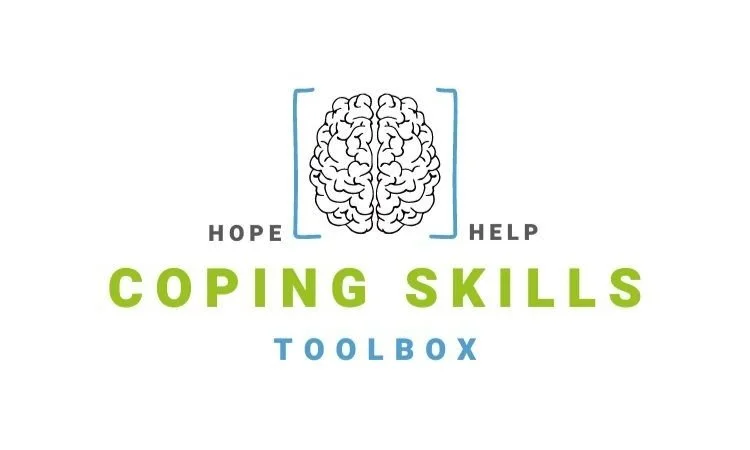STARTING YOUR COPING SKILLS TOOLBOX
In life, we encounter numerous challenges that test our emotional strength. From daily stressors to unexpected crises, navigating through these moments requires resilience and effective coping mechanisms. Just as a handy toolbox can help fix things around the house, having a coping skill toolbox can be invaluable in managing life's ups and downs.
What is a Coping Skill Toolbox?
Think of a coping skill toolbox as a collection of strategies, techniques, and resources that you can turn to when faced with difficult emotions or situations. It's a personalized kit tailored to your unique needs and preferences, designed to help you navigate through life's challenges with greater ease.
Why Start Building One?
Life is unpredictable, and having a coping skill toolbox can provide a sense of empowerment and preparedness. Rather than feeling overwhelmed or helpless when difficulties arise, you'll have a range of tools at your disposal to help you cope effectively. Additionally, investing time in building your toolbox can enhance self-awareness and promote emotional well-being.
How to Build Your Coping Skill Toolbox:
-
Start by reflecting on past experiences and identifying which coping strategies have worked well for you in the past. Consider activities or techniques that have helped you feel calmer or more in control.
-
Explore a variety of coping techniques, including mindfulness exercises, relaxation techniques, physical activities, creative outlets, and social support networks. Look for resources such as books, apps, or online communities that align with your interests and values.
-
Don't be afraid to try out different coping strategies to see what works best for you. What works for one person may not work for another, so it's essential to customize your toolbox based on your individual preferences and needs.
-
Building resilience takes time and practice. Incorporate your chosen coping techniques into your daily routine, even when you're not experiencing significant stress. Consistent practice can help strengthen your coping skills and make them more readily available when you need them most.
If you’re starting from scratch, here are some ideas:
-
Read the story of someone you admire.
Watch a funny YouTube video.
Play with an animal.
Watch a movie you loved when you were younger.
Reorganize your room.
Make a list of places you want to travel or things you want to see in your own town.
Repeat affirmations. Saying an affirmation or statement with positive and personal meaning can bring calm. Pick something that speaks to you: I believe in myself. Fear doesn’t control me. I let go of my sadness. I am safe.
-
Eat a healthy snack.
Drink a glass of water.
Take a shower or bath.
Take a nap.
Brush your teeth.
-
Draw how you’re feeling.
Make a gratitude list. Reflecting on things you are thankful for can help you change your mindset.
Punch a pillow.
Scream.
Let yourself cry.
Rip paper into small pieces.
Vent. Venting is not the same as asking for help—it’s taking an opportunity to share your feelings out loud.
You can also vent by writing a letter to the person who upset you. Keep the letter a couple of days and then tear it up.
-
Make a list of potential solutions to problems – it can help to brainstorm with a friend of family member.
Make a list of your strengths. There are plenty of things about you that are awesome, no matter how down you are feeling at the moment.
If a person has upset you, talk with them directly. Fill in the blanks to this sentence – “I feel ______ when (this happens) because ______. Next time, could you please ________.” Example: “I feel left out when you make plans and don’t tell me until the last minute, because then I can’t join. Next time can you please invite me earlier?”
-
Do something nice for someone you know.
Help a stranger.
Volunteer your time.
-
Learn something new – there are tutorials for all kinds of hobbies online.
Create – try a craft project, color, paint, or draw. Invite a friend to join you for added fun.
Write – you could write a story, a poem, or an entry in a journal.
Get active – dancing, running, or playing a sport are some good ways to get moving.
Play a game or do a puzzle.
Get a plant and start a garden.
-
Practice box breathing.
Try a grounding technique.
Play with a fidget toy.
Go for a walk – feel the ground under your feet and the air on your skin. Focus on your senses.
Find a guided meditation on YouTube.
Do yoga – you can find videos on demand using your tv or online.
Read a book.
Listen to music, a podcast, or an audiobook.
Unplug – turn off your phone, tablet, and/or computer for an hour or so.
Use your five senses. Try the 5-4-3-2-1 grounding technique.
-
Text a friend.
Ask someone to just sit with you.
Call a family member.
Call a friend you haven’t talked to recently.
Call LifeWays 24/7 at 1 (800) 284-8288.
Call the National Suicide Prevention LifeLine at 9-8-8 or text HELLO to 741741.
Building a coping skill toolbox is an ongoing process that requires patience, self-awareness, and commitment. By investing in your emotional well-being and equipping yourself with a range of coping strategies, you can enhance your resilience and navigate life's challenges with greater ease. Remember, you are capable of weathering any storm that comes your way, armed with the tools and resources you need to thrive.


